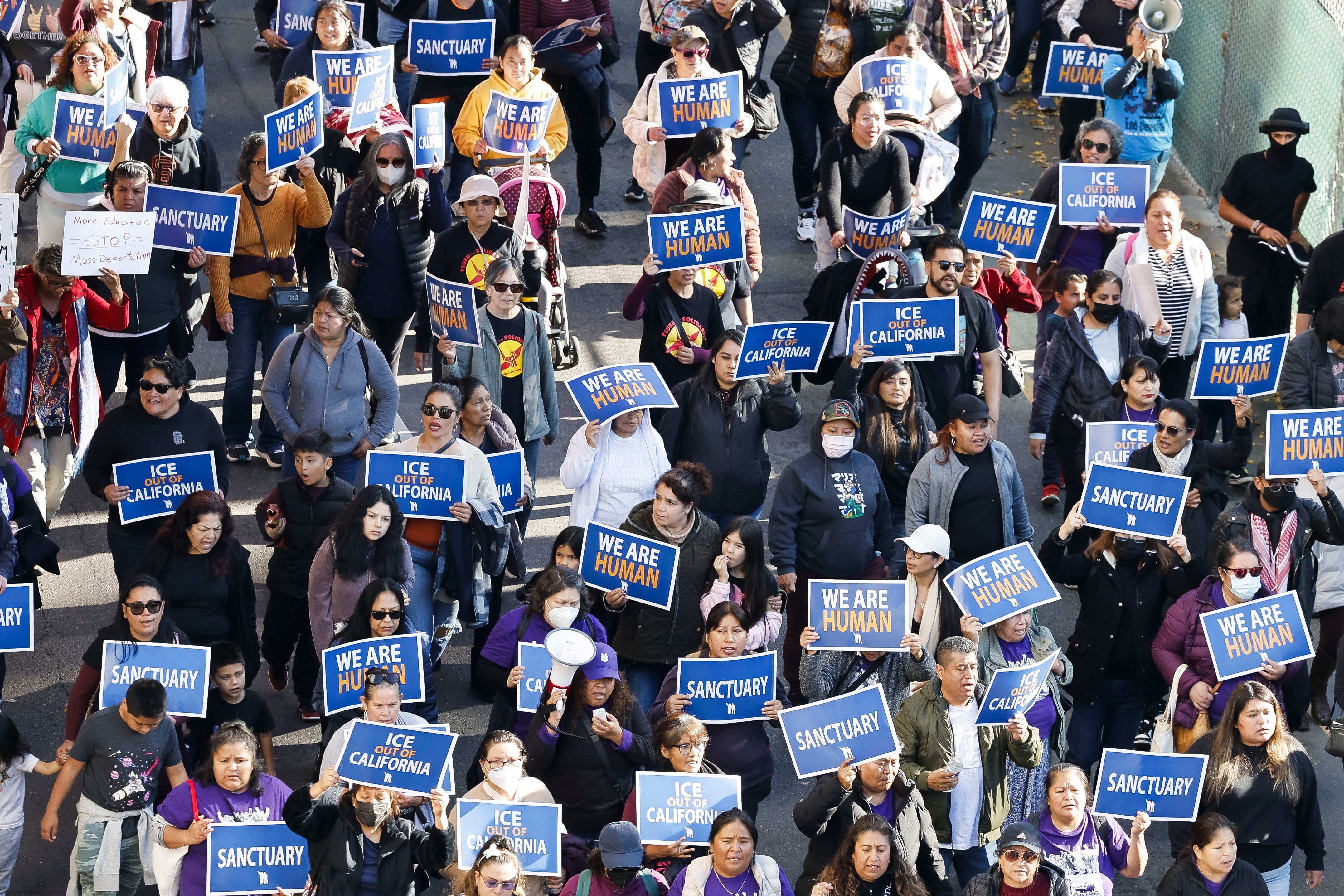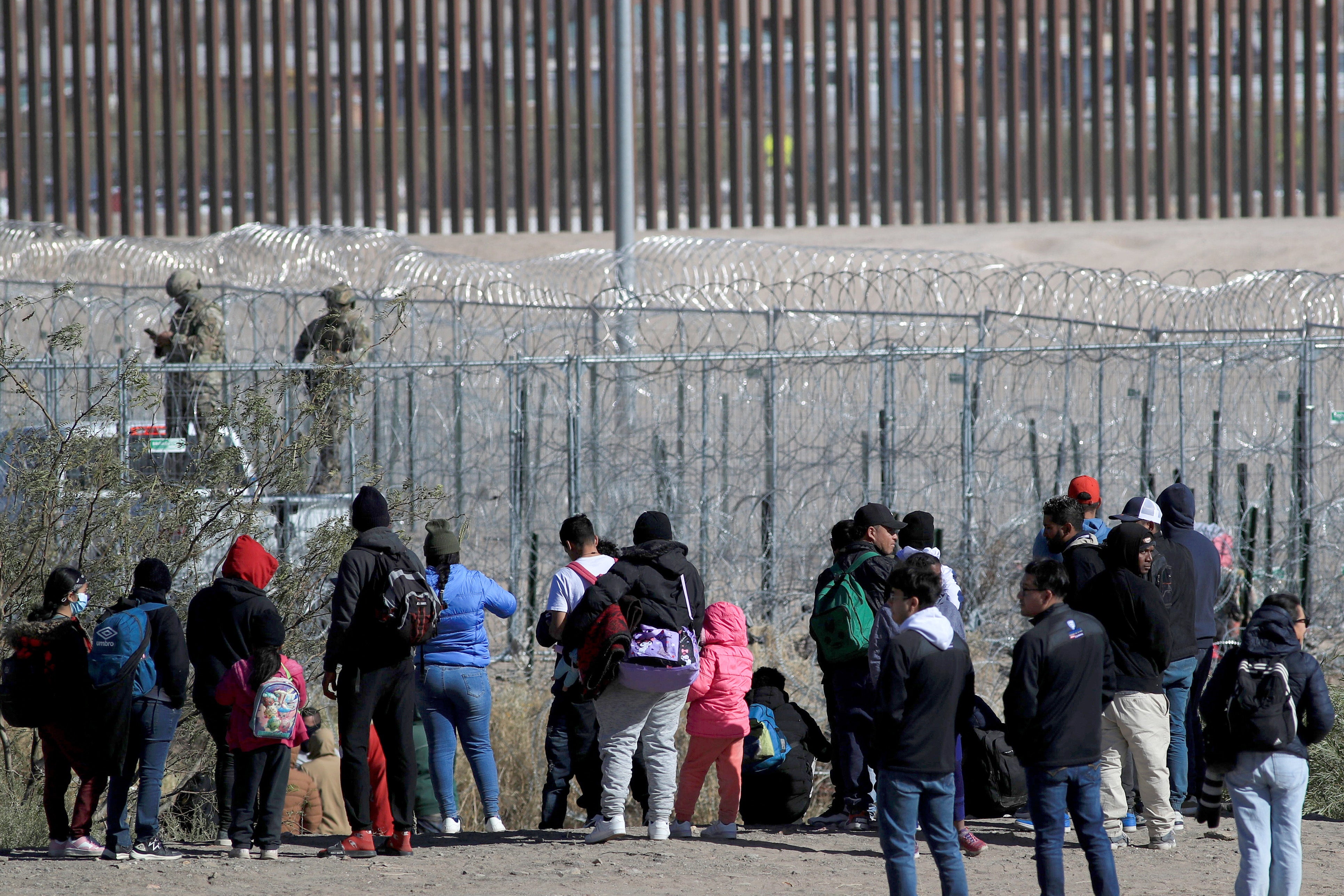The man charged with implementing Donald Trump’s ambitions for what he calls the “largest deportation operation in American history” is previewing his agenda.
Trump and his “border czar” Tom Homan are likely to face a volley of lawsuits and legal obstacles from city and state officials. Homan, in turn, has threatened to prosecute them if they don’t “get the hell out of the way.”
Throughout his 2024 campaign, Trump pledged to arrest, detain and deport people living in the country without legal permission as part of his “day one” agenda. The president-elect promises to deploy federal, state and local law enforcement into immigrant communities he says are “poisoning the blood of the country,” relying on stories of violent crime to support a brutal crackdown that could impact millions of families.
Homan is signaling a return to family detentions and breaking up families with U.S. citizen children, who could be forced into “halfway houses,” with U.S. military assistance, and with “no price tag” for a years-long project that will rely on more funding from Congress.
Trump is also expected to try to end birthright citizenship and block newborns from receiving citizen-affirming documents, likely triggering legal battles and a Supreme Court fight.
Human rights groups are urging President Joe Biden’s administration to take immediate action to shut down problematic detention centers, open legal pathways for millions of undocumented immigrants, and add permanent protections for immigrants with temporary legal status.
“The public may have voted in the abstract for more enforcement, but I don’t think they voted for more family separation or unnecessary cruelty to children,” ACLU immigrants’ rights attorney Lee Gerlent told The Independent.
“Yet repeated statements from the incoming administration suggest that’s what we are looking at, despite the fact that the horrific damage to children from [Trump’s first administration] is still not undone and may never be,” he said.
Family detention and separation
“We’re going to need to construct family facilities,” Homan told The Washington Post. “We need to show the American people we can do this and not be inhumane about it … We can’t lose the faith of the American people.”
Homan said the administration will look to construct “soft-sided” tent facilities that have similarly been used to detain people on the U.S.-Mexico border.
Trump and Homan have repeatedly said that even U.S. citizen children of non-citizen parents are expected to be detained and deported along with their families, and that it will be up to families whether to be deported together or remain separated.
“Here’s the issue,” Homan told the newspaper. “You knew you were in the country illegally and chose to have a child. So you put your family in that position.”

Homan told NBC News that the administration will “end catch-and-release — and that includes family units, too,” referencing a phrase to describe immigrants who are released from detention while awaiting immigration court proceedings.
The Biden administration ended family detention in 2021 with the closure of ICE “residential centers” that housed roughly 3,000 beds in dorm-like facilities.
There are roughly 4 million mixed-status immigrant families in the United States.
“As far as U.S. children, that’s going to be a difficult situation because we’re not going to change your U.S. citizenship,” Homan told NewsNation in a recent interview. “Which means they’re going to be put in a halfway house or they can stay at home and wait for the officers to get the travel arrangements and come back and get the family. You know the best thing to do for a family is to self-deport themselves.”
National emergency and centuries-old wartime law
Trump is expected to declare a national emergency on immigration when he enters office to deploy U.S. military assets to work with state and local law enforcement on immigration policing.
The former president declared a national emergency for U.S.-Mexico border wall construction in his first term in an attempt to bypass a standoff with Congress. Biden rescinded that order shortly after he entered office in 2021.
Trump also intends to invoke the Alien Enemies Act of 1798, which would give the president unprecedented ability to target foreigners for removal, without a hearing or due process, based solely on their place of birth or citizenship.
During the first and second World Wars, the federal government turned to the law to detain and restrict German, Austro-Hungarian and Italian immigrants, and infamously used the law for the shameful internment of Japanese Americans, now widely seen as a stain on America’s 20th century history.

The largely abandoned law states that the president may order the arrests and removal of non-citizens during times of “declared war” or during an “invasion” or “predatory incursion” by “any foreign nation or government,” but Trump and right-wing legal groups are expected to try to interpret the law more broadly by expanding the definition of “invasion” and “predatory incursion” to mean border crossings, and for drug cartels or criminal gangs to be considered a “foreign nation or government.”
“I will rescue every city and town that has been invaded and conquered, and we will put these vicious and bloodthirsty criminals in jail, then kick them the hell out of our country as fast as possible,” Trump said in remarks from Madison Square Garden.
Raids in schools, churches, hospitals and the workplace
Trump’s administration is expected to rescind a 2011 policy limiting deportation arrests in sensitive locations like schools, hospitals and places of worship, or at events like funerals, weddings and public demonstrations.
Homan has also threatened to prosecute Democratic officials in cities with so-called “sanctuary” policies that limit cooperation with federal law enforcement agencies to protect immigrant populations from unjust arrests, detentions or deportations.
“No more sanctuary cities,” Trump declared at a campaign event in North Carolina in September. “As soon as I take office, we will immediately surge federal law enforcement to every city that is failing, which is a lot of them, to turn over criminal aliens.”
The administration is also expected to return to making workplace arrests.
“Worksite operations have to happen,” Homan told Fox & Friends last month.
A group of workers sued the Trump administration in 2018 after an immigration raid at a Tennessee facility, and a federal court approved a $1 million settlement that included some legal protections for workers.
‘No price tag’ for trillion-dollar agenda
Both Trump and Homan have said money is no object when it comes to their agenda.
“It’s not a question of a price tag,” Trump said last month. “We have no choice. When people have killed and murdered, when drug lords have destroyed countries, and now they’re going to go back to those countries because they’re not staying here. There is no price tag.”
Homan admitted to NewsNation that the operation “would be expensive,” but “it’s going to save taxpayers a lot of money in the long run.”
“Right now, we’re spending billions of dollars on free airline tickets, free hotel rooms, free medical care, free meals, the education system,” he said. “We need funding. We obviously need to buy more detention beds because everybody we arrest, we have to detain to work on those removal efforts and get travel documents, get flight arrangements. So we need more detention beds.”

Homan told CNN that means adding at least 100,000 beds, more than doubling the 40,000 detention beds already allocated in ICE funding. He also wants to boost the number of ICE agents.
“They’re not going to be out arresting people, but they can be a force multiplier in doing things we need to do that doesn’t require a badge and a gun,” he said.
Using the full force of federal, state and local law enforcement agencies to identify, detain and deport millions of people living in the country without legal permission could cost more than $967 billion over 10 years, according to the American Immigration Council.
Undocumented immigrants paid federal, state, and local taxes of $8,889 per person in 2022, the group found. For every 1 million undocumented immigrants, public services receive $8.9 billion in tax revenue. Those immigrants, despite paying into government services like healthcare and Social Security, are not eligible for them.
The Institute on Taxation and Economic Policy reported Trump’s plans would eliminate 22 percent of American farmworkers, 15 percent of construction workers, eight percent of service workers, eight percent of manufacturing workers and six percent of transportation workers.







